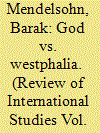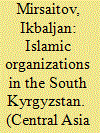| Srl | Item |
| 1 |
ID:
113300


|
|
|
|
|
| Publication |
2012.
|
| Summary/Abstract |
This article presents the operation of al-Qaeda and Hizb ut-Tahrir, two of the most radical Islamist movements, through the lens of the relationship between religion as an organising principle for world politics and the state-based logic. It examines these groups in the context of repeated attempts by religious actors throughout history to render religion the dominant and constitutive element in world politics. Prior to the Peace of Westphalia, religion had a critical role in shaping the political landscape, but Westphalia relegated religion to a secondary position. While it accepted religion's role in the domestic affairs of the units in the international system, the Westphalian order kept religion subordinated to the logic of the state system. But religion maintained its ability to provide an alternative organisation for world politics. While al-Qaeda and Hizb ut-Tahrir are highly unlikely to bring about systemic change, their ascendance should remind scholars that the existing order is not inevitable and that the resurgence of religion in international politics also involves the resurrection of interpretations of religion that compete with and challenge the logic of the state-based system.
|
|
|
|
|
|
|
|
|
|
|
|
|
|
|
|
| 2 |
ID:
127597


|
|
|
|
|
| Publication |
2013.
|
| Summary/Abstract |
The article examines the ways in which official and unofficial Islamic organizations operate in the south of Kyrgyzstan and analyzes their relations with the state. The author notes that unofficial Islamic organizations are mainly forming and developing in the republic's southern regions. The author singles out moderate apolitical and destructive religious-extremist organizations among them, Tablighi Jamaat and Hizb ut-Tahrir, respectively. He goes on to suggest ways for all the sides concerned (the state, Islamic organizations, and the media) to enter into a dialog aimed at opposing extremism.
|
|
|
|
|
|
|
|
|
|
|
|
|
|
|
|